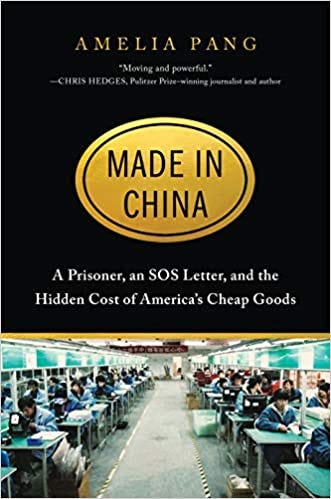Welcome to the Quarantine Creatives newsletter, a companion to my podcast of the same name. If you’re interested in what you read here, you can subscribe to have it delivered to your inbox every Sunday:
Rethinking Consumption
I have been giving a lot of thought to how I spend my money lately and what messages I’m sending with what I support.
If you’ve been reading this newsletter for a while, then you probably know about my maple sugaring project from this past spring. Ben Napier from HGTV’s Home Town (who was one of the early guests on this show) wanted to taste my maple syrup and he agreed to send me some swag from his store in Laurel, Mississippi in exchange.
When Ben’s package arrived, my eye was immediately caught by the “Made in USA” sticker that adorned the box. I was surprised to find a baseball cap inside that had his wood shop’s logo on it and also had a "Made in USA” tag on it.
In theory, I have always appreciated American manufacturing and wanted to support U.S. jobs, but in all honesty, I never paid much attention to where goods originated. I was mostly interested in price and getting the best deal.
Seeing the care that Ben and his team had put into finding an American made hat and supporting local businesses had an impact on me and planted a little seed.
That seed really got fertilized and started to sprout when I started reading Amelia Pang’s book a few weeks ago. As you’ll see from the interview below, many of our goods come from China and can come with a whole host of problems.
After finishing Amelia’s book and speaking with her, I have tried to be a more conscious consumer. There are times where buying Chinese products are unavoidable, and it can be difficult to find American made products in a timely manner. However, even just reducing the amount of things that we purchase can have a big impact. Read on to hear from Amelia why it’s important.
Episode 81- Amelia Pang
Last week, I spoke with journalist and author Amelia Pang. She is an American author of Uyghur and Chinese heritage, and her new book Made in China: A Prisoner, an SOS Letter, and the Hidden Cost of America’s Cheap Goods looks at the problems around Chinese manufacturing with an emphasis on forced labor.
We started off by discussing Amelia’s motivation for writing this book:
“Rarely do we ever have any type of conversation in the media or on social media about how products made in Chinese labor camps end up selling in our stores. So I really wanted to explore the different problems in the supply chain, the different problems in the way that corporations audit their Chinese suppliers, and our complicity as consumers when we buy and support brands that use this type of labor.”
Instead of being a book that tells an overarching story about the big picture of Chinese forced labor, Amelia instead made it primarily an intimate portrait of one man. His name was Sun Yi, and he was imprisoned and forced to manufacture products because he was a practitioner of Falun Gong, a religious group that the Chinese government has banned.
It was an interesting way to tell this large story in a very accessible and sympathetic way. Amelia described to me why she took this route:
“I wanted to show the types of people in these camps. They’re often religious dissidents, pro-democracy activists, ethnic minorities, people who haven’t committed any kind of real or violent crime that end up in these facilities. I wanted to show who they were as human beings, really focus on one or two people’s personal stories just so you can have a character that you can relate to as you follow this man’s life story. His experiences, his early childhood in China, all the way up until the moment he landed in this labor camp and started making products for us.”
Amelia’s writing style is incredibly vivid. While this book is a work of nonfiction, it often read more like a novel. She has the ability to get inside of her subject’s minds and describe what they were thinking, feeling, and experiencing in certain moments.
Some of this is because she tends to press her subjects for sensory details during an interview. She is very interested in the big picture, but also is able to draw out the small moments that bring a scene alive for the reader. She explained why she writes that way:
“I think it’s really important to take people to that scene and to that moment. It can be really annoying for the person I interview to ask them to keep revisiting that moment over and over again and to try to remember these details that seem kind of frivolous to the person. But I think those small details are really, really important for bringing a story to life.”
Many American companies do business with forced labor facilities, even if unwittingly. Often, an American brand will have a contract with a more reputable factory in China, but that factory may outsource some or all of its work to a prison facility. Amelia helped me understand why that is:
“I was quite surprised to find that a lot of Chinese factories, when they make that decision to outsource work to a forced labor facility, it’s not necessarily because they’re just bad, unethical people. It’s a lot more complicated than that. A lot of times, they can’t actually make that product in house for that cheap of a price that our companies gave them. And they can’t make the product as fast as the company required them to. And the reasons why our companies are demanding such low prices and such fast turnarounds is that we as consumers support companies that can offer us the latest trends for the cheapest prices.”
While the Chinese government has been imprisoning political dissidents in forced labor camps for decades, in recent years, they have also been rounding up many of the residents of Xinjiang, a province in the Western part of the country that is home to ethnic minorities like the Uyghurs.
The sudden and secretive imprisonment of this group has echoes of the beginnings of the Holocaust to me, and I asked Amelia if she thought we may be heading toward another mass genocide event like that:
“I think it certainly is at that level. There’s millions of Turkic people such as Uyghurs and Kazakhs that are currently detained in these camps. These are people who are just being rounded up because of their skin color, because of their ethnicity. It’s the entire group that’s essentially disappeared into these camps. They’re forced to undergo forced sterilization procedures, so many of them will no longer be able to have children after they leave the camps. It’s wiping out an entire ethnicity and our products are associated with that.”
If you're interested in learning more about the situation with the Uyghurs, John Oliver did a really fantastic piece on them last year for his HBO show Last Week Tonight:
I highly recommend listening to Amelia’s full interview and reading her book. I hope it will give you some perspective on the true cost of our cheap products. I also highly recommend reading Amelia’s op-ed for the New York Times, where she describes rediscovering her own Uyghur roots.
Being a Better Consumer
I wanted to share a brief excerpt from Amelia’s book about ways to be a more thoughtful consumer. (She was inspired by a sustainable shopping post on Man Repeller). I bookmarked this list from Amelia’s book and find it helpful to contemplate from time to time when considering a new purchase:
1. Do I already own something that serves the same purpose?
2. Is this item so much better that I would feel compelled to donate three things in its place?
3. If it were more expensive, would I still try to figure out a way to afford it? Or am I feeling an urge to buy this only because it’s extremely cheap?
4. If the product I’m considering is an updated version of one that I already own, is my current one working just fine?
5. Am I sure I will wear or use this product a lot? Or will this likely end up sitting in storage after one use?
I also have been looking into options for some of my own favorite products that offer Made in USA lines. This list is hardly comprehensive and may not be helpful to anyone but me, but the point is that with a little research, you can find alternatives. They may cost a few more dollars up front, but they are supporting local jobs here in the U.S. and are not supporting an oppressive system of forced labor.
Justin Boots manufactures some men’s and women’s cowboy boots in El Paso, TX.
Wrangler has a line of men’s jeans that are affordable, made in America, and use American grown cotton.
Many tool companies including Craftsman and DeWalt manufacture some products in the USA and show you which specific tools are American made on their websites.
Do a little homework on your favorite brands, and you may be surprised to learn where and how they manufacture. It’s worth doing some research and using your power as a consumer to fight against these human rights violations.
What’s Coming…
On Thursday, I will be interviewing husband and wife filmmaking duo Steven Ascher and Jeanne Jordan. Their latest film Our Towns runs on HBO this Tuesday and will be available to stream on HBO Max. It looks at small towns across the country that have had to adapt to survive as industry, demographics, and the economy has shifted. It’s a really fascinating conversation about documentary filmmaking and where America is headed. I hope you’ll tune in!
If you have questions, comments, thoughts, ideas, or anything else that you’d like to share, please feel free to email me anytime: hracela@mac.com
If you’re an Apple Podcasts user, please consider leaving a rating or review for Quarantine Creatives. It only takes a minute, but it helps bring in new listeners.
And please consider sharing this with a friend that you think might enjoy reading this, or better yet, share it on social media so you can tell hundreds of friends!
If you’ve missed past issues of this newsletter, they are available to read here.
Stay Safe!
Heath







